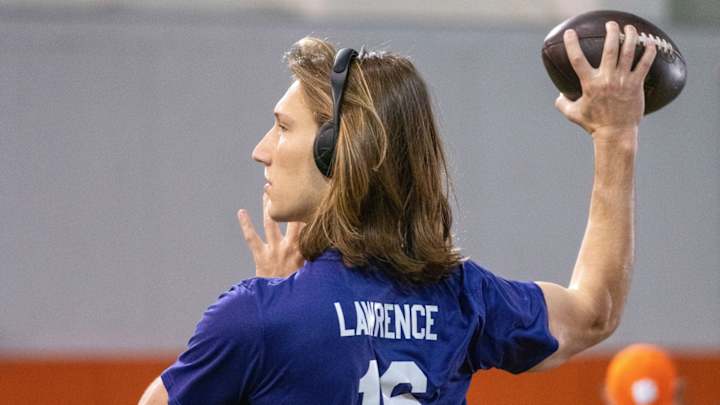Mr. CFB: True or False? NIL Could Be A Disaster For Morale In College Locker Rooms

At this moment, NOBODY knows what is going to actually happen when college athletes finally become free to use their Name, Image, and Likeness to generate income. The possibilities are limitless.
For today’s exercise I want to focus on one component of the NIL debate. And it is this:
It is a given that some athletes will find their NIL more marketable than others. The most popular example in the current discussion has been Clemson quarterback Trevor Lawrence, who was the No. 1 pick in the most recent NFL Draft. It’s not is not a stretch to project that if the NIL rules were in place last season, young Mr. Lawrence would have done very well for himself.
It is also a given that Clemson’s starting left tackle, All-ACC Jackson Carman, would have gotten NIL opportunities, but nothing like those of the matinee-idol quarterback.
So we ask: How would the Clemson left tackle and the rest of the locker room REALLY feel about Trevor Lawrence’s good fortune had the NIL rules been in place?
Would they be happy for Trevor and believe that some opportunities will come their way because they are on the same team with him?
Or will they resent the system and feel their contributions to the team’s success, and by extension Trevor’s success, are not being fully appreciated?
I put the question before two veteran coaches, now retired, who spent a big chunk of their careers in the SEC. Their responses could not have been more different.
“This whole (NIL) thing has the potential to tear a locker room apart,” said one coach. “Football is a team game. What is going to happen when the star quarterback is driving a fancy car and has all this money from various deals? Are they going to block for this guy as hard as they did before?”
The other coach I talked to spent a lot of time in the NFL, where it is very common for the star players to be paid exponentially more than other guys on the roster, including the head coach.
His take on this question?
The players calling for the ability to use their NIL to generate income want to be treated more like professionals. Well, this is what it is like to be a professional.
“Once you get to the league, unless you are a star player, you have to accept that some guys are going to make a lot more money than you. It’s just a fact of life,” said the coach.
In a recent interview Todd Berry, the executive director of the American Football Coaches Association, raised another instance where NIL deals could negatively impact a college locker room.
“Let’s say that a player had a really good (NIL) deal going and he gets beat out by another player,” Berry told Kristi Dosh of the Business of College Sports. “Then that other player who was maybe not getting much, he wants the same things the player in front of him was receiving.”
Berry told Dosh that he was also concerned that boosters could upset the locker room by insisting that the player they are financially supporting should be getting more playing time.
The players themselves know that the more they play the greater financial benefit they will probably have under NIL. So they will be demanding more playing time, carries, receptions, etc.
“I just think it’s going to be a mess, particularly in the early going,” said the former coach. “It is going to be tough to hold a locker room together.”
The other coach said that college football has adjusted over the years to a number of changes and it will adjust to the realities of NIL.
“Change is never easy but change happens,” he said. “The good coaches always adjust.”
